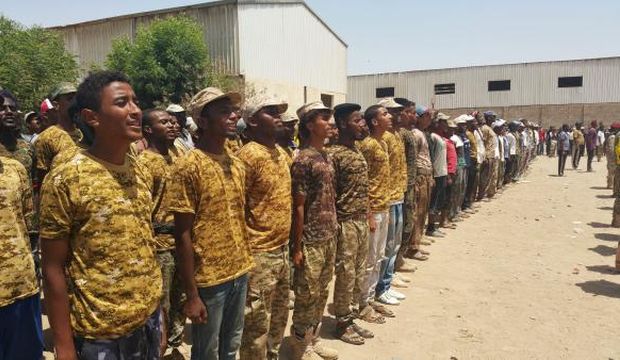
New recruits to forces loyal to Yemen’s exiled government in Saudi Arabia chant as they enlist in the southern port city of Aden, Yemen, on August 23, 2015. (Reuters/Stringer)
Sana’a and Muscat, Asharq Al-Awsat—The Saudi-led coalition targeting the Houthis in Yemen on Sunday bombed the group’s northern stronghold of Saada, in the heaviest assault on the province since the start of the coalition’s air campaign in March.
Informed Yemeni sources told Asharq Al-Awsat that more than 100 individual strikes were carried out by coalition warplanes, as part of a new phase of the anti-Houthi campaign aiming to build on recent victories against the Houthis and their allies.
Government loyalist forces, known as the Popular Resistance, aided by coalition airstrikes and elements from the Yemeni army in recent weeks have captured several southern areas from the Houthis including the port city of Aden and provinces of Lahj, Al-Dalea and Abyan.
The new phase of the campaign, which has included the introduction of Emirati ground forces, aims to retake the central province of Ma’rib from Houthi militias and use it as a springboard to liberate other areas of the country occupied by the Iran-backed group since last September, including the capital Sana’a, the sources said.
The Houthis declared a state of emergency in Saada and Sana’a earlier this month and in an unprecedented move, the group’s leader Abdul Malik Al-Houthi admitted defeat in Aden to the Popular Resistance and made overtures toward the government, expressing his group’s readiness to conduct dialogue with them in a bid to solve the current crisis in the country.
Meanwhile, UN Special Envoy to Yemen Ismail Ould Cheikh Ahmed arrived in the Omani capital Muscat on Sunday to hold talks with Houthi representatives. This follows meetings he held last week with Yemen’s internationally recognized President Abd Rabbuh Mansur Hadi.
Ould Cheikh Ahmed is carrying a number of demands made by Hadi and the government to the Houthis as a precondition for holding talks with the group. They include the immediate cessation of military action by the Houthis and their withdrawal from areas in the country currently under their control.
The Houthis must also hand over all weapons seized from the state back to the government and the Yemeni army as well as agree to disband their militias, a process which the government wants overseen by international military observers appointed by the UN.
The Houthis must also agree to vacate government, media, and military buildings and institutions they have occupied throughout the country since last September leaving the government to carry out its duties in full capacity.
Yemen’s current crisis began last September when the Houthis occupied Sana’a and then spread to other areas of the country. In February the group staged a coup, disbanding the government and placing President Hadi and members of the cabinet under house arrest.
Hadi later fled to the Saudi capital Riyadh where he requested Saudi Arabia and its Arab allies intervene with military force in Yemen to restore him and the internationally recognized government to power. The Saudi-led campaign targeting the Houthis in Yemen began on March 26.
Meanwhile, on Sunday reports circulated that Al-Qaeda’s branch in Yemen had taken control of Aden’s main port on Saturday night. However, sources from the Aden Ports Authority denied the reports.
The sources told Asharq Al-Awsat all the city’s ports were still under the full control of the Popular Resistance and were also being guarded by forces from the UAE, a member of the Saudi-led coalition.
Mirza Al-Khuwaylidi contributed additional reporting from Muscat.
